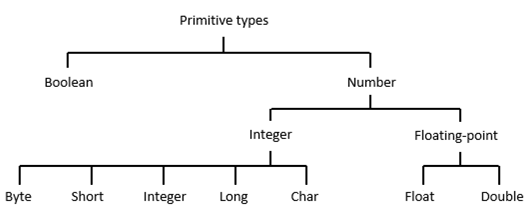
| Type | Size | Range | Example |
| Byte | 8 bits | -128 to +128 | byte a, b; |
| Short | 16 bits | -32,768vto +32,767 | short c, d; |
| Integer | 32 bits | -2,147,483,684 to +2,147,483,647 | int i; |
| Long | 64 bits | -9223372036854775808 to +9223372036854775807 | long x,y; |
| Char | 16 bits | 0 to 65,536 char is only unsigned |
char c; |
| Name | Size | Range | Example |
| Double | 32 bits | 1.7e-308 to 1.7e+308 | Double a,b; |
| Float | 64 bits | 3.4e-038 to 3.4e+038 | Float a, b; |
Ask Question